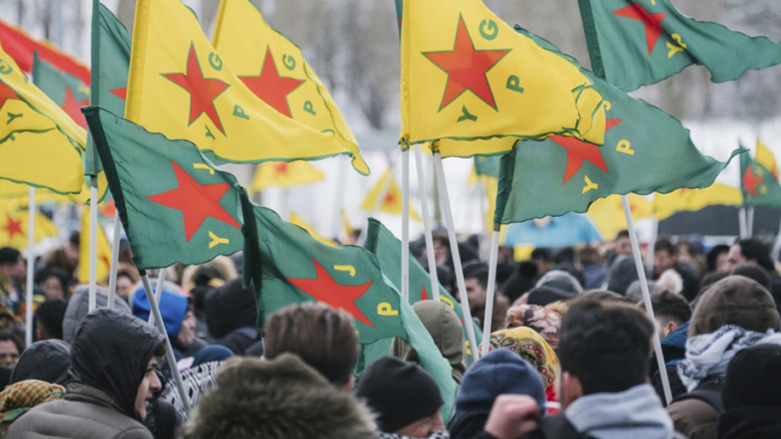German court increases fine for activist who waved Kurdish group's flag

ERBIL (Kurdistan 24) - A court in Munich on Tuesday has slapped a German activist and journalist with even a higher 4,400 euro fine in addition to an earlier fine he received for waving a flag of the Women’s Protection Units (YPJ), an armed Kurdish group in Syria, during a protest in February.
“I was sentenced to a fine of 4,400 euros,” Anselm Schindler told Kurdistan 24. “The judge says that the flags of the YPJ and YPG are also used by the PKK [Kurdistan Workers Party] and therefore they cannot be shown.”
In October, Schindler, a freelance journalist and activist, who writes for media outlets such as Taz, Junge Welt, and Neues Deutschland, received a total fine of 3,600 Euros. But on Tuesday, he was slapped with an even higher fine of 4,400 euros.
In his defense, Schindler told the court, he waved the YPJ flag during the NATO conference in Munich on Feb. 17, 2018, in support of democratic forces fighting the Islamic State (IS) in Syria.
“It is thanks to the People's (YPG) and Women's Defence Units (YPJ) that the so-called Islamic State has since been pushed back in most parts of Syria,” he said.
According to Schindler, Germany has decided to support Turkey instead of supporting Syrian Kurds.
“The German state has opted for the second option, preferring to support Erdogan in the fight against democratic construction in northern Syria and supplying him with weapons. In this context, the repression against the Kurdish movement and its supporters in Germany can be seen,” he said in court.
“We refuse to ban the flags of those who fight for the dignity of humanity in Syria. And we will not accept that in the name of German imperialism and in the name of Erdogan, those who defend against ISIS and for a new life are slandered,” he added in his defense.
In March 2017, the German Interior Ministry issued a notice to all the nation’s states with the title “Update on the PKK ban” and prohibited various Kurdish symbols including YPG, YPJ, and PYD (Democratic Union Party) flags.
The PKK is a Kurdish rebel force currently engaged in a decades-long war with the Turkish government for broader Kurdish rights. The PKK is banned in Germany and considered a terrorist organization by the US and EU.
In multiple German states, activists complain that German citizens are harassed or prosecuted for posting the YPG flag on social media or, as in Schindler’s case, waving it during protests. However, several local courts, such as one in Berlin, have since ruled against the ban on YPG and YPJ flags, resulting in de-facto of easing of the ban.
Still, in conservative states such as Bavaria, the ban continues. Several activists had to appear in court, were fined, or their homes were searched for possessing YPG flags.
“Tomorrow, the day after tomorrow and next week, there will be further court appointments against comrades. We will not accept the court decisions and appeal. If this doesn’t work, it will go to a higher court,” he added.
YPG spokesperson Nouri Mahmoud told Kurdistan 24 in March that Germany’s ban on YPG flags was unethical since it was the YPG that protected Berlin and other Western capitals against attacks by IS.
“We have defeated global terrorism. There are still thousands of terrorists captured by our forces. We are protecting Germany, Europe, the World. At the time we fought these terrorists, we were protecting Europe, especially Germany because if we didn’t [fight], IS would hit many other parts of Europe,” he concluded.
Editing by John J. Catherine
